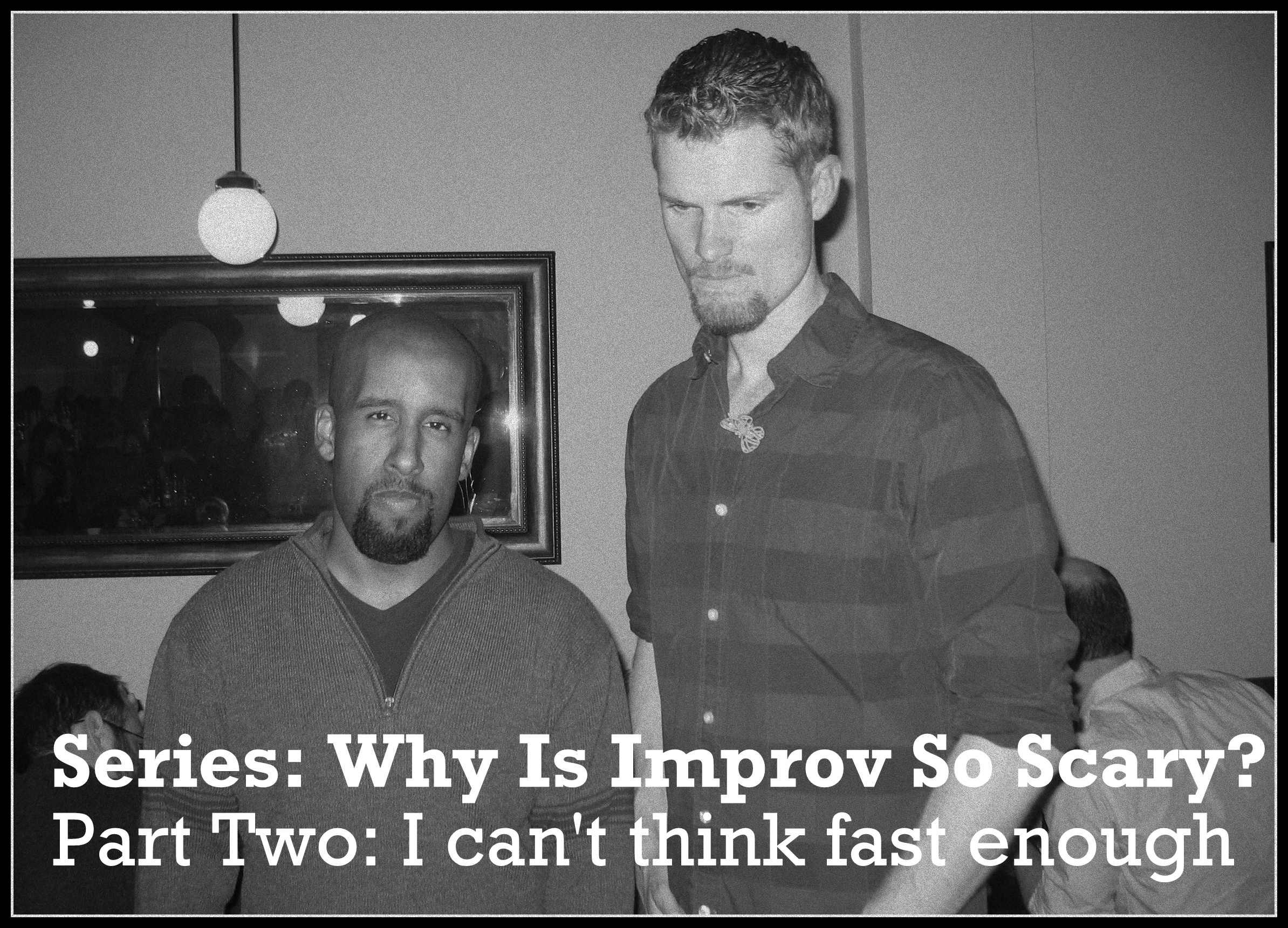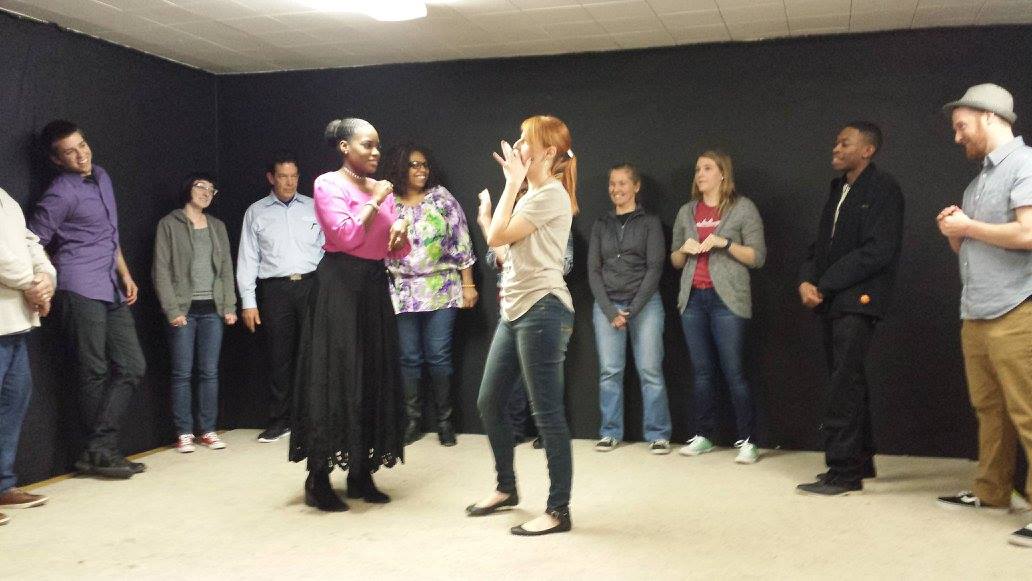This is it. The very final post in our “Why is improv so scary?” blog series. My typing fingers are heavy with ennui, but I’ll try to stay strong.
In case you’ve forgotten, here are the improv-related fears we’ve examined so far in this series:
· I’m not funny
· I can’t think fast enough
· I’ll look ridiculous
· I’m not outgoing
· I don’t trust my fellow improvisers
I won’t say that we dispelled these fears, because they are all totally legitimate fears to have. We did, however, take a look at why these fears live inside us. We also gave ourselves permission to confront these fears and tell them to get lost.
This week, we’ll discuss our last – and maybe most important – fear: “I don’t really know what improv is.”
Improv is often characterized by its driving principle: “Yes, and.” This phrase refers to a guideline that is helpful during improvised scenes: First, agree with whatever your scene partner said. Then, add your own idea. But even people familiar with “yes, and” might still feel unsure about what improv actually entails.
If you walk into an improv class tomorrow, there will be about eight to twelve students in the room. You'll be there for about two hours, and during that time you'll do a range of activities. At the beginning, you might stand in a circle and play some games to help everyone connect with each other and shift their focus to the group. Then, you might play some games that involve creating scenes with two or more people (this is the same as playing pretend). At the end, you might take a few minutes to talk about how your week went, what you appreciate about your fellow students and what you took away from the class that day.
Okay. Fine. You caught me. I was distracting you with a description of an improv class because I cannot tell you what improv actually is because I DON'T KNOW. ARE YOU HAPPY NOW.
Improv is a strange beast with eighteen eyes and big old wings and lion’s feet and the head of an alpaca. Like all artistic genres, there’s no catch-all definition. If you asked nine painters to define visual art, you’d get nine different answers. Likewise, if you asked nine directors to define theatre, no two answers would be exactly the same.
So I went to some of my favorite improvisers and asked them for their personal definitions of improv. Here are the answers I got:
· “Theatre created in the moment, which – like all theatre – has the power to inform, entertain, and touch people when performed from a place of authenticity and heart."
· "Improv is playing pretend for an audience. An improv class should provide the skills so that an audience will be entertained by your pretending. Those skills for an entertaining style of pretend also happen to be life skills that bring joy, confidence, and teamwork."
· "Improv is the spontaneous but sculpted result of mining the conspicuous human condition for all its buried whimsy."
· "Improv is convincingly playing pretend in front of an audience."
· "Improv is about people having each other’s backs and accepting that we’re all in this shit together, so let’s have fun and try to create something interesting."
· "Improv is trusting your friends to help you build a world, a scene, a moment – and then trusting them to live in it with you."
· "Improv is living in everyone’s head at once."
· "Improv is free-fall brain candy stepped in live action communion in the here and now."
· "Improv is the love child of life lessons and boundless fun."
Behold: Nine different answers to the same question. (Okay, Jon and Colin had the same answer. But they run Improv Cincinnati together so if they’d never colluded about this it would be problematic.)
Behold again: Not only do all these improvisers know each other, they’re in the same troupe. They do improv together and they can’t even agree on what improv is. And that’s okay, because they have the same goal: To entertain and edify their audience without planning one single thing beforehand. (That sounds asinine when I type it out. But it isn’t. If you don’t believe me, go watch their full-length improvised musical on Saturday nights.) The purpose of an improv class or rehearsal is to help a team of people incrementally build up an arsenal of "improv tools" - things like agreement, vulnerability, onstage relationships, risk-taking, curiosity and game-playing - that will help them play pretend in a way that's fun, truthful and engaging. That's why there's no need to be funny or quick-witted in order to enjoy improv. It's all about building your toolbox.
Behold one more time: There is a tiny little presence inside all of us that loves challenges and adventures. This little presence wears a safari cap and carries a map and points confidently into the distance with steely eyes. If the idea of trying improv appeals to your inner adventurer, take a workshop. Sign up for a class. It’s okay if you don’t know what improv is.
Nobody really does.
Check out these books if you’d like to dive deeper into improv and its various definitions: Truth in Comedy by Charna Halpern and Del Close, Improvise by Mick Napier, Improvisation for the Theater by Viola Spolin, Improv Wisdom by Patricia Madsen, and Impro by Keith Johnstone. If you really want to get down and dirty, go to ImprovCincinnati.com and check out some videos from real classes and workshops to see what you can expect.
..........
***BONUS TRACK*** ***RAP SONG AIRHORN SOUNDS***
We at Improv Cincinnati decided to create this blog series because trying improv for the first time is f*cking scary. Instead of trying to convince people that it isn’t (because it is), we decided to shine a spotlight on the fears that we and others experienced when we first started learning about improv. In order to really wrap our minds around what’s scary, we started asking everyone we know what scares them about improv. The six fears we examined in this series are the six statements we heard most often.
But fear isn’t what improv is about. To close out our series, I want to provide you with a different list. This time, I asked everyone I know this question: What is the biggest gift improv has given you? Here’s what they said.
Insight ♦ Confidence ♦ The realization that “Yes, and” isn’t just an improv skill, but a life philosophy ♦ The ability to listen intently ♦ Choosing positive responses ♦ I met my girlfriend in an improv class three years ago ♦ Freedom to be myself ♦ Developed my imagination ♦ Best friends ♦ Trust ♦ General social confidence and public speaking that has transformed me over the last 11 months ♦ Confidence, friendships, mindfulness ♦ All of the beautiful weirdos ♦ Acceptance ♦ People that have my back both on and off the stage ♦ Laughter ♦ It is the one place I can truly turn my brain off and be present in the moment ♦ Listening and celebrating other people’s ideas ♦ A family ♦ The idea that it is my job to make others look good and to rely on other to do the same ♦ Fearlessness ♦ Letting me be weird ♦ Bombing and surviving ♦ It focused all of my energy in a really natural and positive way ♦ Confidence to work as a teacher ♦ Courage, the joy of play, people who support, appreciate and embrace me exactly as I am, and who inspire me to do the same for others and myself ♦ Friends who do improv ♦ Freedom to accept without judgment, freedom to use every available tool and any given moment, freedom from expectation. It’s jazz for actors. Just jamming. All freedom ♦ An increased ability to accept the given circumstances rather than worry about what could have been ♦ Confidence, helped me become less self-conscious, quick problem-solving ♦ Freedom ♦ Taught me to be patient and not to misdirect a situation in an attempt to be funny – just wait and the funny will come ♦ Yes, and ♦ It helped me deal with anxiety and enjoy life rather than put a pause on it, then it gave me the ability to meet so many great people ♦ That it’s not about being comfortable, it’s about being okay being uncomfortable ♦ Confidence, a push toward graduate school, and a research agenda ♦ The best kind of success comes from failure ♦ The ability to laugh at myself ♦ The ability to not overthink and to let fear go when performing ♦ A village for this idiot ♦ Learning to focus on my scene partner and not on myself ♦ My job! It’s an interview skill ♦ Laughter.
Carry on in your commitment to truthfulness and joy, ye improvisers. There is no pursuit more noble. ‘Til next time.
- Improv Cincinnati




















